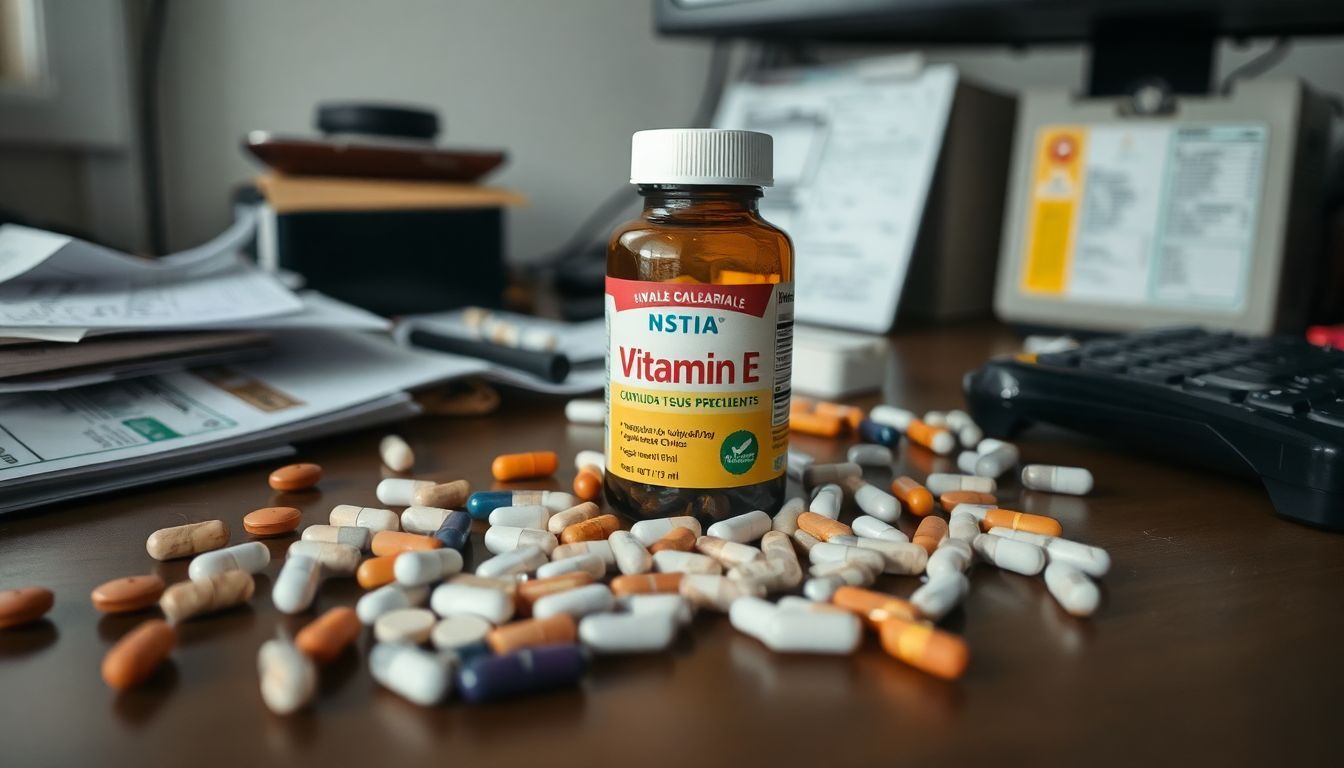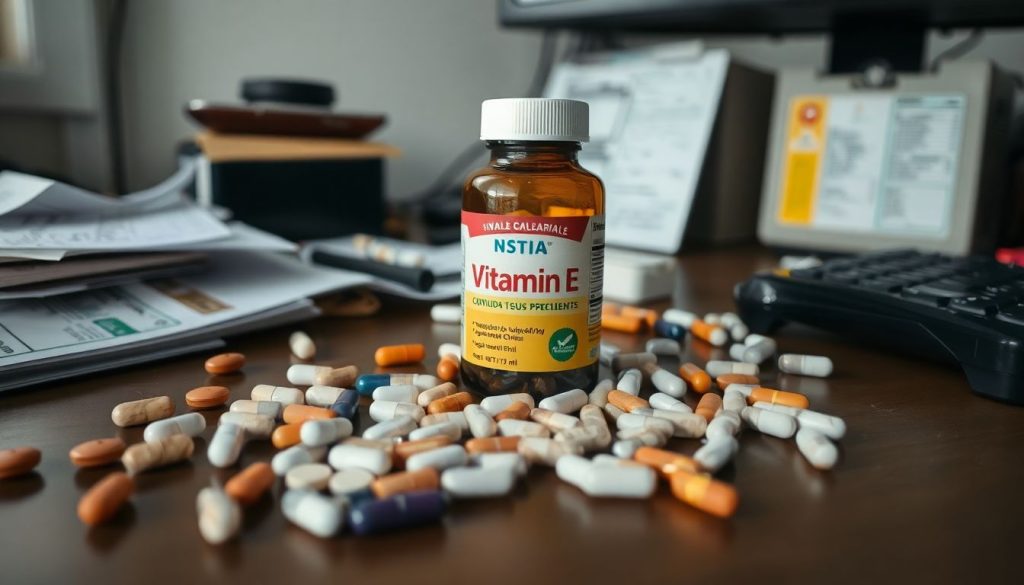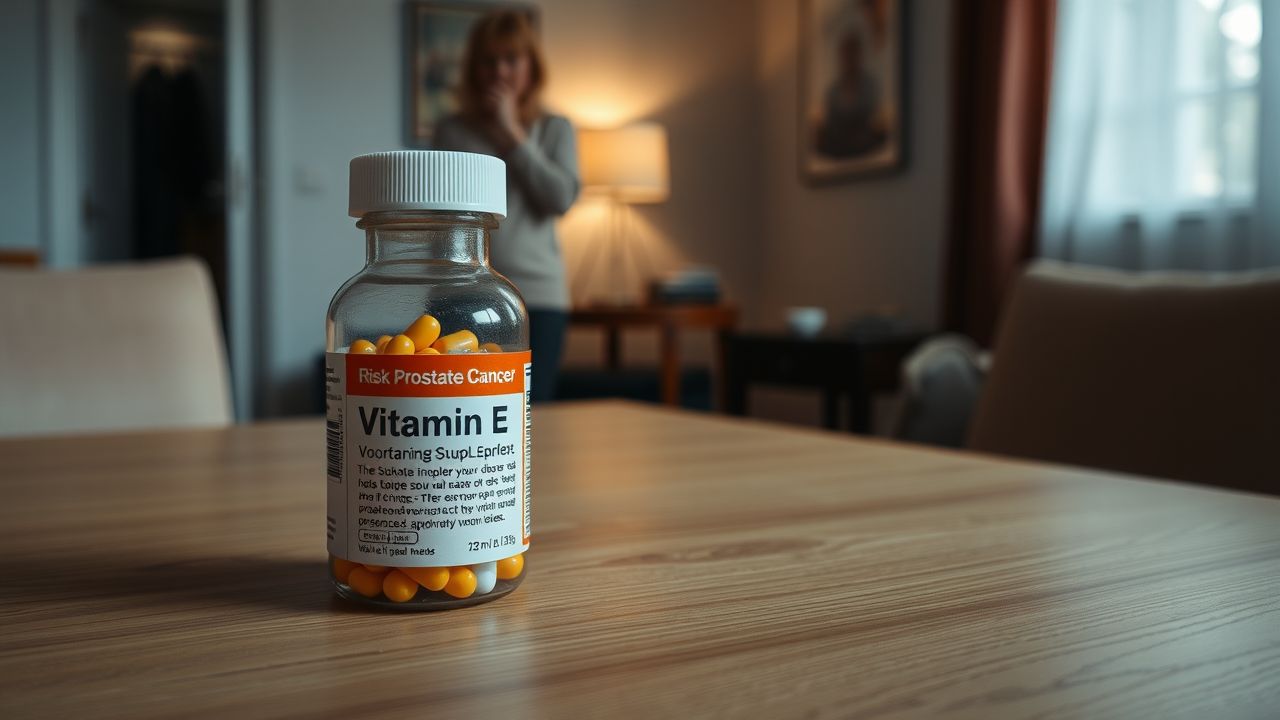Many men take vitamin E, thinking it helps their health. But did you know it may raise the risk of prostate cancer? Studies, like the SELECT trial, revealed surprising findings about this common supplement.
Thank you for reading this post, don't forget to subscribe!Keep reading to learn what science says and how to protect your health.
Key Takeaways
- Taking 400 I.U. of synthetic Vitamin E daily may raise prostate cancer risk by 17%, as shown in the SELECT trial from 2011.
- Combining selenium with Vitamin E increased high-grade prostate cancer risk by up to 91% in men with adequate selenium levels, according to the SELECT findings.
- Food sources like nuts and spinach provide safer forms of Vitamin E compared to supplements, which showed risks in studies.
- Regular screenings, healthy diets rich in antioxidants, and exercise are better for lowering prostate cancer risks than relying on supplements.
- Some scientists disagree about the risks of Vitamin E due to variations in study design, diet factors, or use of synthetic vs. natural forms.
Overview of Recent Findings
Recent research shows a link between Vitamin E and an increased risk of prostate cancer. Studies also explore the role of selenium in this connection, raising more questions about supplement safety.
Vitamin E and increased prostate cancer risk
Taking 400 I.U. of vitamin E daily can raise prostate cancer risk. A study from 2011 found that men who took this dose had a 17% higher chance of developing prostate cancer compared to those on a placebo.
In the trial, over seven years, there were 76 cases per 1,000 men in the vitamin E group. In contrast, only 65 cases appeared per 1,000 men in the placebo group. This data suggests caution for those considering high-dose supplementation.
Selenium and prostate cancer risk
High selenium levels may not protect against prostate cancer. Men with adequate selenium who took supplements faced a 91% higher risk of developing high-grade prostate cancer, according to SELECT findings.
These results have raised serious concerns about the use of selenium as a preventive measure.
Selenium combines with Vitamin E in some products marketed for cancer prevention. Yet evidence suggests this combination doesn’t work. In fact, low baseline selenium paired with Vitamin E increased prostate cancer risk by 63%.
This highlights the potential dangers of supplementing without understanding personal nutritional needs or risks.
“Excesses of certain nutrients can cause harm rather than prevent disease.” — Journal of the National Cancer Institute
Detailed Analysis of Key Studies
The SELECT Trial studied the link between Vitamin E and prostate cancer. Another study analyzed past research to explore how Vitamin E might raise or lower risks.
SELECT Trial findings
The SELECT trial started in 2001 to study prostate cancer prevention. It tested vitamin E, selenium, and their effects on lowering cancer risk. By 2008, early findings showed no protection against prostate cancer from these supplements.
In 2011, a follow-up revealed concerning results—men taking 400 I.U. of synthetic vitamin E daily had a 17% higher risk of developing prostate cancer compared to others. This raised questions about the safety of high-dose vitamin E in healthy men seeking disease prevention through dietary supplements.
Meta-analysis by WQ Loh et al.
A large meta-analysis led by WQ Loh included data from 32 studies. It examined over 1.2 million participants and identified 58,415 prostate cancer cases. The results showed no strong link between dietary vitamin E intake and prostate cancer risk (RR = 0.97, CI = 0.92-1.02).
This suggests that consuming vitamin E through food might not significantly increase or decrease the chances of developing this type of cancer.
The team emphasized the need to assess various factors affecting these findings—such as study design and participant characteristics. While this analysis focused on natural dietary sources of vitamin E, it’s unclear if synthetic forms would show a different effect on prostate health risks long-term or in high doses commonly seen in supplements.
Mechanisms Potentially Linking Vitamin E to Prostate Cancer
Vitamin E might affect prostate health by disturbing certain biological processes. It can change how cells respond to damage and interact with other compounds like selenium.
Biological pathways affected by Vitamin E
Vitamin E can damage DNA, leading to uncontrolled cell growth. This process may encourage the development of prostate cancer. It also triggers the production of reactive oxygen species (ROS).
ROS cause oxidative stress, which harms cells and creates inflammation—a known cancer risk factor.
CYP enzymes increase under high doses of synthetic Vitamin E. These enzymes promote more ROS and add to cellular damage over time. Such changes in biological pathways heighten prostate carcinogenesis risks, as suggested by studies like the SELECT trial findings….

Interaction between Vitamin E and other minerals
Vitamin E can affect how the body uses other minerals, like selenium. Studies show high doses of synthetic vitamin E may block selenium’s protective effects against prostate cancer.
Selenium works with antioxidants to reduce oxidative stress, but too much Vitamin E disrupts this balance.
Scientists also study how zinc and calcium interact with Vitamin E. Zinc supports enzyme activities and immune health. Too much Vitamin E might lower zinc effectiveness in cells. Imbalances between these nutrients could increase cancer risk or cell damage over time.
Implications for Supplement Use
High doses of Vitamin E may do more harm than good, especially for prostate health. It’s important to understand how supplements impact the body before adding them to your routine.
Recommendations for Vitamin E consumption
Vitamin E supplements may not be as safe as once thought. Studies show a link between vitamin E and prostate cancer risk.
- Avoid using high doses of synthetic vitamin E. Synthetic forms have shown possible risks in studies like the SELECT trial.
- Limit daily intake to food sources like nuts, seeds, and spinach. These provide natural vitamin E without the same risk tied to supplements.
- Consult your doctor if you use vitamin E regularly. This is crucial for those with a family history of prostate cancer.
- Combine vitamin-rich foods with other antioxidants like beta carotene, but avoid over-relying on supplements.
- Skip large-dose combo pills containing selenium and vitamin E unless prescribed. The SELECT trial found they didn’t prevent cancers and might increase certain risks.
- Choose balanced multivitamins without overly high levels of any single nutrient, including Vitamin E.
- Monitor your overall supplement use carefully if you live in areas with selenium deficiency or eat diets low in antioxidants.
- Opt for small doses below 15 mg daily if supplementation is absolutely necessary for specific health needs or deficiencies.
- Regularly review new evidence about dietary trends involving vitamins and antioxidants through trusted medical journals or advice from healthcare professionals.
- Focus on prevention through broader lifestyle changes like regular exercise, healthy eating, and avoiding smoking instead of relying solely on pills for health benefits.
Alternatives to Vitamin E for prostate health
Some men want to avoid risks tied to Vitamin E but still care for their prostate health. Here are safer options worth trying.
- Eat a Healthy Diet
Foods rich in antioxidants like tomatoes, broccoli, and pomegranates can support prostate health. These foods help fight oxidative stress that may harm cells. - Increase Selenium Intake from Food
Selenium, found in nuts (especially Brazil nuts), fish, and eggs, may have protective effects. Focus on natural sources instead of supplements for better bioavailability. - Add More Soy Products
Soy contains isoflavones that may lower prostate cancer risk. Try including tofu, soy milk, or edamame in your meals. - Get Enough Zinc
Zinc plays a key role in maintaining prostate function. Pumpkin seeds and shellfish are great natural sources of zinc. - Drink Green Tea
Green tea contains compounds called catechins that might slow cancer growth. Aim for two to three cups daily. - Consider Omega-3 Fatty Acids
Omega-3 fatty acids from fish like salmon and mackerel reduce inflammation in the body. Lower inflammation is linked to better prostate health. - Stay Active with Regular Exercise
Exercise reduces obesity, which is a known risk factor for many cancers including prostate cancer. It also helps balance hormones linked to disease progression.
These alternatives can improve overall well-being while reducing dependency on Vitamin E supplements…
Differing Opinions in the Scientific Community
Scientists do not all agree about Vitamin E and prostate cancer risk. Some studies find no harm, while others point to flaws in these claims.
Studies suggesting neutral effects
Some studies show no clear link between supplemental vitamin E and prostate cancer risk. Research found a relative risk (RR) of 0.99, with a confidence interval (CI) of 0.94–1.04.
This data suggests that taking vitamin E might not increase or decrease the chance of developing prostate cancer.
Other research focuses on differences in location and study design, which could explain mixed results. For example, European studies reported reduced risks, while others didn’t see significant effects at all.
Variations like these raise questions about how factors such as genetics or diet may play a role in outcomes related to dietary supplements like synthetic vitamin E or selenium use during clinical trials.
Critiques of methodology in negative studies
Negative studies on vitamin E and prostate cancer risk often face scrutiny. Researchers highlight variability in how vitamin E was assessed across trials. Some studies used synthetic vitamin E, while others included natural forms, making comparisons tricky.
Regional differences in diet also added layers of complexity, as diets rich in selenium or certain antioxidants can affect outcomes.
Sample size issues are frequent concerns too. Smaller groups may skew results or fail to detect meaningful links between supplements and risks like high-grade prostate cancer. Publication bias adds another challenge—positive findings tend to get more attention than neutral or negative ones.
These factors raise questions about the robustness of conclusions drawn from some analyses, including meta-analyses using pooled data with inconsistencies across methodologies.

Vitamin E, Selenium, Soy: Why This Combo Doesn’t Prevent Prostate Cancer
The combination of vitamin E, selenium, and soy has shown no clear benefit in preventing prostate cancer. In fact, studies highlighted that taking selenium with or without vitamin E heightened the risk of high-grade prostate cancer among men with sufficient selenium levels.
This was evident during the Selenium and Vitamin E Cancer Prevention Trial (SELECT), where researchers found these supplements neither reduced cancer cases nor offered protective effects.
Soy also failed to show a significant role in lowering prostate cancer risks when combined with these two nutrients. Scientific data suggests that interactions between synthetic vitamin E and other compounds might disrupt biological pathways rather than protect them.
For men considering dietary supplements for prostate health, understanding real risks is crucial before relying on such combinations as a preventive measure.
Guidance for High-Risk Groups
Men with a family history of prostate cancer should be cautious about taking supplements like Vitamin E. Those already using these should discuss their risks with a doctor for better guidance.
Men with family history of prostate cancer
A family history of prostate cancer raises the risk. Studies like the SELECT trial found men taking 400 I.U. of vitamin E daily had a higher chance of prostate cancer than those on a placebo.
Genetic factors may affect how vitamin E interacts in these cases, making the risk even greater.
High doses of dietary or supplemental vitamin E offer little protection for these men. Instead, regular screenings and discussions with doctors about risks are key steps for prevention.
Men currently using supplements
Men using supplements should exercise caution with vitamin E. The 2011 study revealed a 17% higher risk of prostate cancer in those taking 400 I.U. daily. Supplements may seem harmless but could cause serious issues, especially with high doses.
Dr. Eric Klein advises against large amounts of vitamin E for most men. Those already taking it should reconsider their dosage or consult a doctor. Combining vitamin E with other supplements like selenium doesn’t lower the risk either, based on findings from the SELECT trial.
Awareness and moderation are crucial for staying safe while using supplements.
Preventative Measures Beyond Diet
Regular health check-ups can help detect prostate issues early. Staying active and reducing stress may also protect your overall well-being.
Regular screening and tests
Detecting prostate cancer early can save lives. Regular health check-ups and screenings are key to managing prostate cancer risk.
- Get a Prostate-Specific Antigen (PSA) test. This blood test checks PSA levels, which can indicate prostate issues, including cancer.
- Schedule Digital Rectal Exams (DRE). A doctor feels the prostate for lumps or abnormalities. It’s quick and simple.
- Talk about your family history with your doctor. Men with a family history of prostate cancer may need earlier or more frequent screening.
- Know your age group’s risks. Men over 50 should start routine testing; African American men or those with a family history may need to start at 40–45.
- Ask about imaging tests like MRIs or ultrasounds if PSA levels are high or irregular.
- Stick to regular schedules for screenings, even without symptoms, as early-stage cancer often has none.
- Use telehealth options when possible for follow-ups—convenient and efficient for discussing findings or concerns with your doctor.
- Track all results over time to monitor changes in PSA levels or any risk factors detected during exams.
Lifestyle and environmental factors
Leading a healthy lifestyle and managing environmental risks can reduce prostate cancer risk. Simple changes make a big difference in long-term health.
- Eat more fruits and vegetables. A diet rich in vitamins, fiber, and antioxidants lowers oxidative stress linked to cancer.
- Avoid high-fat foods. Reducing fat intake supports better prostate health and lowers obesity risk.
- Quit smoking. Smoking increases DNA damage and raises the chances of cancer recurrence or spread.
- Limit alcohol consumption. Drinking too much alcohol boosts inflammation and oxidative stress in the body.
- Stay active daily. Regular exercise reduces obesity, which is a known cancer risk factor.
- Minimize exposure to harmful chemicals. Substances like polycyclic aromatic hydrocarbons (PAHs) may increase free radicals that harm cells.
- Reduce stress through activities like yoga or meditation. Chronic stress weakens your immune system over time.
- Choose natural environments when possible. Fresh air improves respiratory health, lowering overall body strain.
These steps protect your health while addressing key environmental concerns tied to prostate cancer risks!
Conclusion
Research shows new risks tied to vitamin E supplements for prostate health. Stay informed and explore safer options with your doctor.
Summary of findings
Vitamin E supplements may increase prostate cancer risks. The 2011 “Selenium and Vitamin E Cancer Prevention Trial (SELECT)” found men taking synthetic vitamin E had a 17% higher risk of prostate cancer.
Over 241,000 new cases were projected that year in the U.S., with over 34,000 deaths.
Selenium was also studied but offered no protection against prostate cancer. Combined use of selenium and vitamin E did not reduce risks either. These findings raised concerns about using dietary supplements for cancer prevention—especially among high-risk groups like those with a family history.
Future research directions
Genetic factors influencing vitamin E and selenium on prostate cancer risk need more study. Researchers are analyzing blood levels to discover how these nutrients affect high-grade prostate cancer chances.
Future trials may focus on differences between synthetic and natural vitamin E impacts. Scientists could also explore oxidative DNA damage, biomarkers, or using real-time PCR techniques for precision in assessing risks.
References
- https://www.nih.gov/news-events/nih-research-matters/prostate-cancer-risk-vitamin-e-supplements (2011-10-17)
- https://www.fredhutch.org/en/news/center-news/2014/02/vitamin-e-selenium-prostate-cancer-risk.html (2014-02-21)
- https://pmc.ncbi.nlm.nih.gov/articles/PMC3682779/
- https://www.cancer.gov/types/prostate/research/select-trial-results-qa
- https://pmc.ncbi.nlm.nih.gov/articles/PMC9824720/
- https://www.mdpi.com/2072-6643/15/12/2677
- https://www.nature.com/articles/s41598-019-48213-1
- https://pmc.ncbi.nlm.nih.gov/articles/PMC4169010/
- https://www.health.harvard.edu/blog/selenium-vitamin-e-supplements-increase-decrease-prostate-cancer-risk-201402287059 (2014-02-28)
- https://www.mayoclinic.org/diseases-conditions/prostate-cancer/in-depth/prostate-cancer-prevention/art-20045641
- https://www.health.harvard.edu/blog/vitamin-e-may-indeed-increase-the-risk-of-prostate-cancer-201111031948
